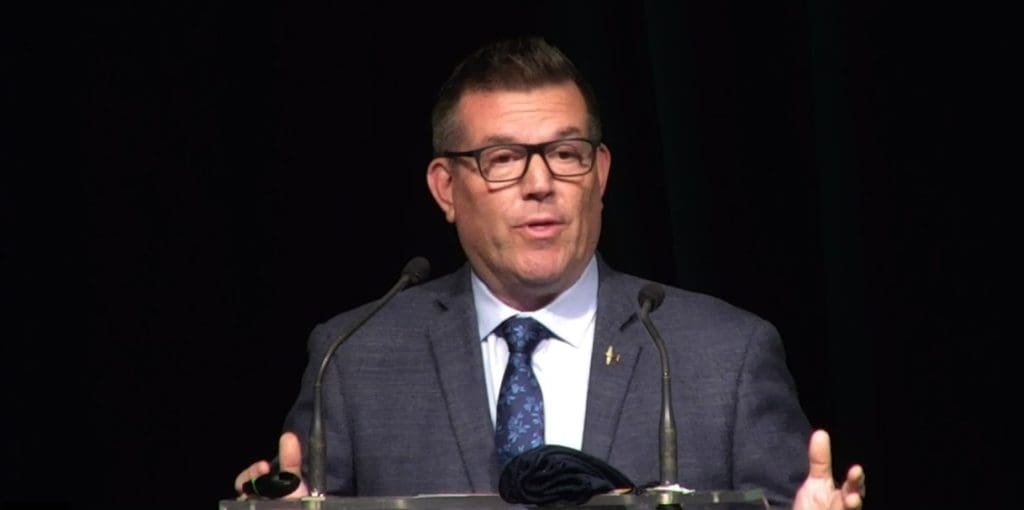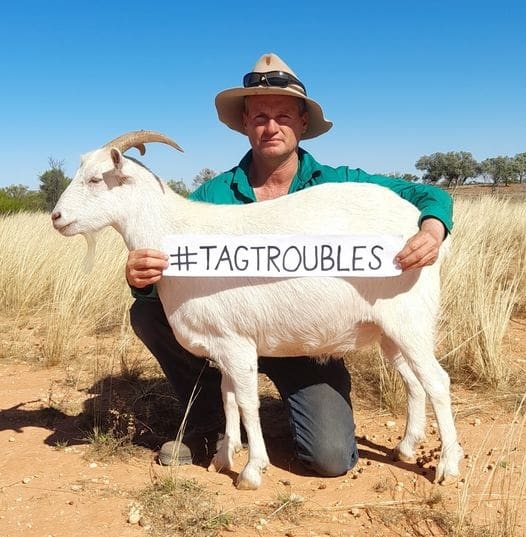
NSW Minister for Agriculture Dugald Saunders puts his case for national sheep EID traceability to the NSW Farmers conference last year.
NEW South Wales’ Minister for Agriculture Dugald Saunders has claimed the Federal Government has not committed enough funding for the proposed mandatory sheep and goat electronic identification rollout.
The Federal Government last year committed $20.1 million for special purpose payments for co-investment with states and territories to support industry traceability improvements.
The government committed $26.6 million for upgrading the livestock traceability database as part of broader traceability reform.
But in response to a question from Pastoralists’ Association of West Darling council member Lachlan Gall, Mr Saunders said he didn’t think the $20.1 million co-investment commitment is sufficient.
Reading a question from an anonymous texter, Mr Gall relayed that the cost of the EID roll-out for sheep and goats would be $190-210m (nationally) for tags alone over the next three years and asked Mr Saunders:
“Do you think the $20 million funding from the Federal Government for the next three years is sufficient?”
“No … no I don’t, no,” Mr Saunders said.
“I think it’s way under what the Federal Government needs to spend.
“We are going to continue working with the Federal Government on what the uplift from the Federal side of things needs to be and NSW is working on a plan to make sure that we can maximize our contributions and our support,” he said.
“But there does need to be a national plan funded from the Federal Government proactively in as quicker time frame as possible.”

PAWD council member Lachlan Gall
Mr Gall later said the anonymous texter was a sheep industry representative who based the $190-$210m tag cost estimate on Australia’s sheep flock average over the past five years plus an increase in farmed goat numbers.
Putting a second question from his mystery texter, Lachlan declared the full cost of a national over the next 10 years would be $800 million (nationally over 10 years).
“Do you think this is a cost industry can afford and where is the cost-benefit study? Mr Gall asked.
“Look I’m not sure where the $800 million comes from, we’ve been looking specifically at the New South Wales impact, I’m sure the director-general could talk a bit more about the cost components we’re looking at,” Mr Saunders said.
“And we are looking a split; processor, saleyards, producers and industry as a whole.
“So you know we’re looking at a shared plan on this, as opposed to it all being on one stakeholder; it’s not on one stakeholder,” he said.
“At the end of the day as Mark (Inglis, Thomas Foods) said originally, it’s about making sure consumers – not in Australia, but overseas in Japan, South Korea, China, US — keep buying the stuff that you’re producing.
“So I’m doing absolutely everything we can to make sure that we’re supporting producers, but at the same time we’ve got to get the processors and the saleyards ready to make sure that they’re ready for all the stuff that’s going to come in,” Mr Saunders said.
NSW Department of Primary Industries director general Scott Hansen said he believed a national costing had been done at the behest of the national Sheep and Goat Traceability Task Force, and NSW DPI had done preliminary costings to see if there was financial merit for the economy in the mandatory roll-out. He believed the PwC material will be made available. He did not know what the timing on this would be, “but it’s going to be available from that group,” Mr Hansen said.
He said the final cost would be predicated around the federal government’s announcement on an assistance package and what happened with any national tag tender.
“So those two bits are probably the two outstanding bits that aren’t able to be modelled at this point in time.”
Federal EID contribution is “unusually high” – Watt
At a recent Senate Estimates hearing, federal Minister for Agriculture Murray Watt said it was understanding that traditionally traceability has been led and funded much more by states and territories.
“So we are making an unusually high contribution to this by a Federal Government and that’s because we think it is a really important thing for the country.
“So I would argue that the contribution we are making is much higher proportionally than we’ve seen from Federal Governments in the past, regardless of their political persuasion.”
So who has done national EID system cost estimates?
Sheep Central has been told that ABARES costings for a national sheep and goat EID system were presented to the National Biosecurity Committee in March 2022 and a PricewaterhouseCoopers (PwC) cost modelling tool has been distributed to the state jurisdictions to assess their likely EID costs. Media reports have quoted the PwC model cost range for a national sheep-goat EID system as $350-$400 million and Nationals senator Perrin Davey told a Senate hearing she had been quoted a $350-$450 million range.
Mr Gall believed his unidentified texter had put forward valid cost estimates, but believed that any costings done at a federal and state level should be released.
“Generally speaking, you could say that this whole process is riddled with Donald Rumsfeld’s ‘known unknowns and unknown unknowns’.
“For the average livestock producer, there are a few known unknowns and quite a few unknown unknowns.”
Mr Gall said “more broadly” the various committees, task forces and representative organisations have got to start doing a better job of communicating with and listening to grassroots producers.
“This whole process is completely opaque at ground level.
“It would be fair to say that most producers haven’t got a clear understanding of the mandate and the problems associated with it.”
Cost-sharing discussions are continuing – SPA
Sheep Producers Australia chief executive officer Bonnie Skinner said the cost model that was delivered by PwC is a nationally integrated and scalable tool designed to generate cost estimates at each supply chain point by jurisdiction for the implementation of EID under different scenarios.
“The national cost model tool was designed to support government and industry’s future cost and investment decisions for implementation.
“The Sheep and Goat Traceability Task Force (SGTTF) was informed at the last meeting that discussions between the states and federal government are continuing regarding the equitable allocation of funding to support on-farm and off-farm traceability improvements,” she said.
“The SGTTF state representatives have advised that they are working through costings, with the support of state-based working groups comprising supply chain representatives and participants.”
Ms Skinner gave evidence at the 2022 Senate Standing Committee on Rural and Regional Affairs and Transport’s recent inquiry into the adequacy of Australia’s biosecurity measures and response preparedness, emphasising the need to address these whole-of-system reform measures.
“The committee included in its recommendations the review of national livestock traceability funding and co-funding mechanisms to ensure they are sustainable, comprehensive, and equitable (Full report noting recommendation 13).”
Minister Watt non-commital on future funding
Mr Watt today did not indicate if the Federal Government is prepared to commit further co-investment funds to a national mandatory sheep/goat EID rollout beyond the $20.1m already announced.
“The Commonwealth, state and territory governments are committed to delivering the livestock traceability system that industry has been calling for.
“We continue to progress plans for a national EID traceability scheme through the Agriculture Ministers’ Meeting process,” he said.
“At our September meeting, ministers agreed to work towards national implementation of sheep and goat EID in all states and territories by 2025.
“This is a major step forward in the goal of a national scheme, which has been put in the too-hard basket for a long time,” he said.
“We are realistic that it will take a bit of time to roll out across the whole nation, but we are committed to getting this long-awaited improvement started.
“The Albanese Government has made a $46.7 million down payment to co-invest with states and territories on these important reforms,” Mr Watt said.
“This includes $20 million to support on and off-farm traceability improvements, including EID for sheep and goats as well as $26.6 million to support upgrades to the database system.
“Livestock traceability is a shared responsibility between industry, states, territories and the Commonwealth,” he said.

HAVE YOUR SAY